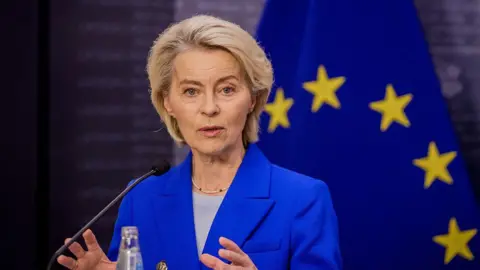Ursula von der Leyen, President of the European Commission, has successfully navigated a confidence vote initiated by a far-right faction in the European Parliament, marking a significant moment in her leadership just a year after she began her second term. Although the outcome was expected, the very occurrence of the vote raises concerns about her standing in European politics.
Rarely seen in the EU, these confidence votes are historically infrequent, with the last one targeting former Commission chief Jean-Claude Juncker over a decade ago. The motion required a two-thirds majority—480 votes from the 720 total Members of the European Parliament (MEPs)—to pass, but it ultimately drew only 175 votes in favor, while a significant 360 voted against it and 18 abstained.
The vote was launched by Romanian far-right MEP Gheorghe Piperea, who challenged von der Leyen’s transparency, particularly regarding her communications with Pfizer during Covid-19 vaccine negotiations. In the motion, he asserted that her administration had jeopardized foundational democratic principles like transparency and accountability.
During an intense parliamentary debate, von der Leyen defended herself against what she termed the "conspiracy theories" espoused by her accusers, labeling them "extremists" and "anti-vaxxers." She described the accusations concerning communications with Pfizer, dubbed "Pfizergate," as falsehoods. Despite significant backing from prominent figures, such as Hungarian Prime Minister Viktor Orban, the vote found limited support from within Piperea's own European Conservatives and Reformists (ECR) group, with members from Italy’s Brothers of Italy siding with von der Leyen.
Her coalition's strength came from the center-right European People's Party (EPP), the Socialist & Democrats (S&D), the liberal Renew Europe, and the Greens. Despite this, her leadership has faced growing criticism from various political factions who are wary of her cooperation with the far-right, particularly regarding decisions on migration and environmental policies.
Valérie Hayer, the leader of Renew Europe, cautioned von der Leyen that their support was conditional and urged her to reestablish EPP's direction away from extreme right alliances. S&D leader Iratxe García remarked that while their support wouldn’t signify uncritical approval, dismantling the Commission during a geopolitical crisis would be "irresponsible." The S&D eventually voted in favor of her following assurances regarding planned social budget cuts.
As the confidence vote unfolded, von der Leyen addressed the Ukraine Recovery Conference in Rome, reaffirming her commitment to European values in response to external destabilizing forces. Soon after the motion's defeat, she expressed gratitude for the vote of confidence and emphasized the need for unity among European nations.
Rarely seen in the EU, these confidence votes are historically infrequent, with the last one targeting former Commission chief Jean-Claude Juncker over a decade ago. The motion required a two-thirds majority—480 votes from the 720 total Members of the European Parliament (MEPs)—to pass, but it ultimately drew only 175 votes in favor, while a significant 360 voted against it and 18 abstained.
The vote was launched by Romanian far-right MEP Gheorghe Piperea, who challenged von der Leyen’s transparency, particularly regarding her communications with Pfizer during Covid-19 vaccine negotiations. In the motion, he asserted that her administration had jeopardized foundational democratic principles like transparency and accountability.
During an intense parliamentary debate, von der Leyen defended herself against what she termed the "conspiracy theories" espoused by her accusers, labeling them "extremists" and "anti-vaxxers." She described the accusations concerning communications with Pfizer, dubbed "Pfizergate," as falsehoods. Despite significant backing from prominent figures, such as Hungarian Prime Minister Viktor Orban, the vote found limited support from within Piperea's own European Conservatives and Reformists (ECR) group, with members from Italy’s Brothers of Italy siding with von der Leyen.
Her coalition's strength came from the center-right European People's Party (EPP), the Socialist & Democrats (S&D), the liberal Renew Europe, and the Greens. Despite this, her leadership has faced growing criticism from various political factions who are wary of her cooperation with the far-right, particularly regarding decisions on migration and environmental policies.
Valérie Hayer, the leader of Renew Europe, cautioned von der Leyen that their support was conditional and urged her to reestablish EPP's direction away from extreme right alliances. S&D leader Iratxe García remarked that while their support wouldn’t signify uncritical approval, dismantling the Commission during a geopolitical crisis would be "irresponsible." The S&D eventually voted in favor of her following assurances regarding planned social budget cuts.
As the confidence vote unfolded, von der Leyen addressed the Ukraine Recovery Conference in Rome, reaffirming her commitment to European values in response to external destabilizing forces. Soon after the motion's defeat, she expressed gratitude for the vote of confidence and emphasized the need for unity among European nations.




















